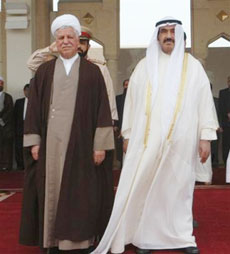Iran: 'Psychological war' not in US' interests
(AP)
Updated: 2006-04-17 08:27
DAMASCUS, Syria - Iran's former president accused the United States Sunday of
waging "a psychological war" against Tehran and said an American strike against
the Islamic republic would not be in Washington's interests.

The Head of the Islamic Republic of Iran's
Expediency Council Hashimi Rafsanjani, left, stands besides Kuwaiti Prime
Minister Sheikh Nasser Al-Mohammad Al-Ahmad Al-Sabah at Kuwait
International Airport after his arrival to Kuwait on Sunday, April 16,
2006. [AP] | Former Iranian President Hashemi
Rafsanjani, who heads the Expediency Council, a powerful body that mediates
between Iran's parliament and clerical hierarchy, said Western nations' attempts
to block Iran's nuclear program were "unjust."
"Iran's success in uranium enrichment is for the interest of the region's
countries and all Islamic countries," Rafsanjani said. He reiterated the
government position that Iran's nuclear program was not intended to harm any
country in the region.
"If the United States launched a military strike against Iran, that would be
neither in its interests nor in the interests of the entire region," Rafsanjani
told a joint news conference in Damascus with Syrian Vice President Farouk
al-Sharaa.
He said he believed that the United States was "incapable of taking a risk or
engaging in a new war in the region without discussing the subject seriously."
U.S. media reports have said the Bush administration was considering a
military attack on Iran over its nuclear program, which Washington claims is
designed to produce nuclear weapons. Iran says it is purely for generating
energy.
President Bush has dismissed reports on attack plans as "wild speculation."
On Tuesday, Iran's hard-line president, Mahmoud Ahmadinejad, announced that
Iran had successfully enriched uranium, which can be used to fuel nuclear
reactors or build atomic bombs. Iran has rejected a U.N. Security Council demand
for it to stop enriching uranium by April 28.
U.N. Secretary-General Kofi Annan wants a negotiated solution to the crisis
over Iran's nuclear ambitions, he said in an interview published Sunday in the
ABC newspaper.
Annan told the conservative Madrid daily during a visit last week to Spain
that any military operation against Iran would worsen a tense international
situation.
"I think the issue is being handled properly by the International Atomic
Energy Agency. I still believe that the best solution is a negotiated one, and I
don't see what a military operation would resolve," ABC quoted Annan as
saying.
|